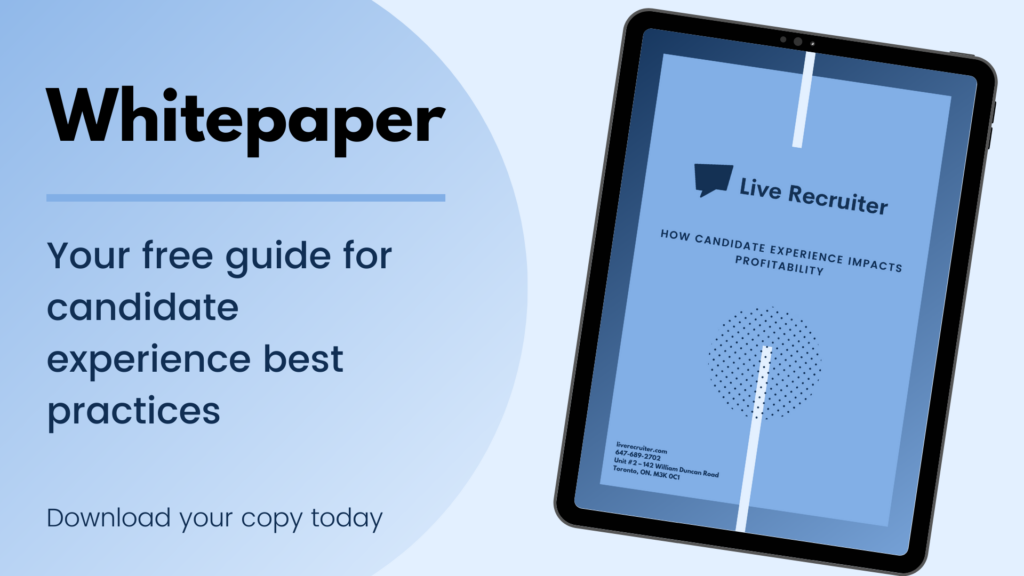The talent acquisition landscape
In 2021, the talent acquisition industry faces a number of unprecedented challenges. Having been forced to adapt numerous processes to a remote context, the pandemic has further highlighted existing gaps in recruitment practices, namely a lack of focus on experience. In a market shaped by experiences, many companies have invested in providing a positive customer experience. Its impact on the bottom line is well documented. According to the White House Office of Consumer Affairs, a dissatisfied customer will tell nine to fifteen others about their poor experience, with 13% of dissatisfied customers sharing their negative experience with 20 or more people. Candidate experience, like customer experience, has an impact on profitability, but this is generally overlooked. In 2021, best-in-class companies are looking to improve their candidate and employee experience. Today’s priorities in talent acquisition reflect a holistic approach to improving hiring, with diversity, technology, and work-life balance, amongst other factors, all being fundamental.
1. Candidate experience
The scale of a company’s talent acquisition efforts is generally correlated with the level of candidate experience it can provide. In high volume hiring, it is challenging to provide a great candidate experience. Accordingly, 58% of candidates do not receive any response after applying to a job. Currently, only 10% of companies have a budget dedicated to candidate experience. Most organizations do not consider whether or not their processes adhere to candidates’ values and expectations, such as transparency and consistent communication. Ultimately, investment in candidate experience boosts engagement and gives organizations the best chance at finding the right match for their needs.
2. Diversity and inclusion
Diversity has a proven correlation with company success. Diverse organisations are 45% more likely than others to increase their market share. Further, they are 35% likelier than their less diverse competitors to fiscally outperform their industry’s national average. Candidates care about diversity as well; 67% of job seekers report that they consider how diverse an organization is when deciding whether or not to apply there. Correspondingly, businesses and recruiters are focusing on fostering an equitable and fair company culture conducive to a diverse workforce.
3. Barriers to internal mobility
In 2020, internal mobility became a major focus across industries and a high priority for job seekers. 32% of recruiters report that career pathing is essential to attract and retain millennials. Barriers to internal mobility typically involve hard skills, such as education or years of experience. Justin Huschka, talent acquisition leader at Koch Industries, prioritizes “a contribution mindset, alignment with the company’s guiding principles, and talents or skills that are valuable to the business”. This reflects a general trend to prioritize soft skills over hard skills for promotion decisions.

4. Automation and AI
Inevitably, technology plays a significant role in talent acquisition and beyond. From applicant tracking to managing remote teams, best-in-class companies that continually invest in new technologies are likely to see positive results. However, 87% of job seekers feel that an over-reliance on automation has made the job search feel more impersonal, which results in a negative candidate experience. While automating some processes, such as interview scheduling or resumé screening, prevents recruiter burnout, candidates ultimately appreciate person-to-person contact. Maintaining the human element is crucial to provide a positive candidate experience.
5. Employer branding
Both negative and positive candidate experiences influence the employer brand. In 2020, 77% of candidates shared their positive experiences with their networks, while 52% shared their negative experiences. Companies that provide an engaging positive word of mouth candidate experience will see this reflected in their performance. Recruitment marketing is a crucial initiative for companies to boost their employer brand. Only 67% of candidates gave a 4 or 5 star rating based on the information they discovered while researching employers on their own. With this in mind, companies that do not invest in recruitment marketing are unlikely to attract candidates or referrals from candidates. See below for the Aptitude Research findings on the impact of candidate experience on NPS scores (Net Promoter Score), customer retention, and employer branding.
6. Employee and recruiter experience
Recruiter burnout is a significant but often overlooked barrier to positive candidate experience. A renewed focus on experience in talent acquisition should also address recruiter experience. If recruiters are unhappy and disengaged, this negatively impacts candidates’ experience. Overworked hiring teams are unlikely to deliver positive results, especially in a remote work context. Recruiters spend upwards of 16 hours weekly scheduling calls and 10 hours searching for candidates in their applicant tracking systems. Accordingly, 32% of recruiters surveyed by Aptitude Research stated that they are seeking other career opportunities. Therefore, businesses assessing their experience offering should examine their internal processes.
7. Adapting to hybrid work
A global survey by Slack of over 9,000 knowledge workers determined that of those surveyed, 72% would prefer to have a hybrid work schedule (a combination of both in-person and remote work) even after the pandemic allows for full-time in-person work. With this trend in mind, organizations must continue investing in their remote hiring initiatives. Consistent communication with candidates and transparency about culture, compensation, and other factors are key. In turn, leaders must be able to “lead, motivate, and engage remote teams”, according to Manjuri Sinha, global head of talent acquisition at OLX group.
Final takeaways
Talent acquisition priorities in 2021 focus primarily on improving experience. A holistic approach to this involves going beyond candidate experience and examining other factors, such as recruiter experience, that have a major impact on talent acquisition outcomes and company performance. The organizations that centre inclusion, candidate expectations, employee experience, balancing tech and the human element, internal mobility, and their employer brand will be able to optimize their hires and ensure profitable outcomes. Organizations should keep experience at the forefront of their strategies and decision-making, looking both externally and internally at the experience candidates and employees have with their companies. With 90% of organizations excluding candidate experience from their budgetary planning, an investment into the aforementioned initiatives presents an opportunity for businesses to build competitive advantage.



